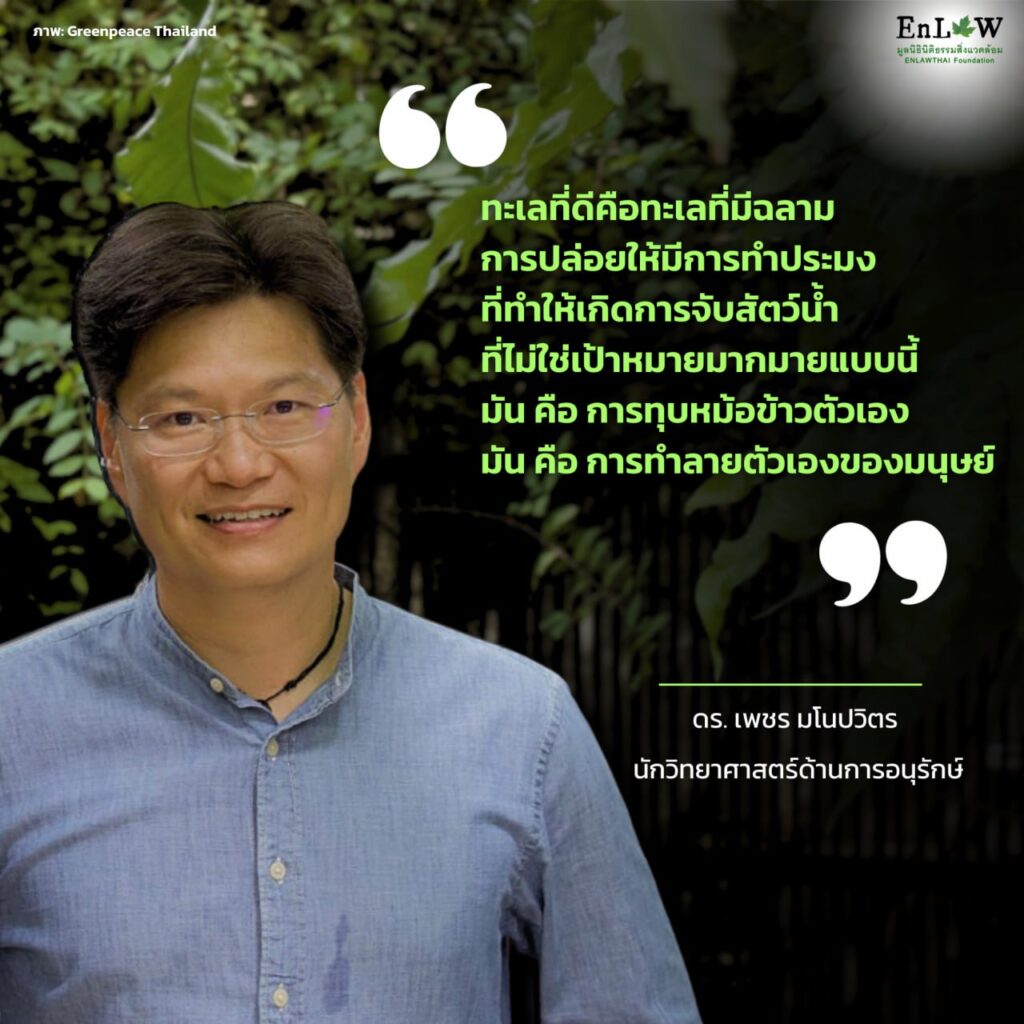There would be no mediation ahead of the court’s schedule as the client acted in the public interest, according to Dr. Petch’s lawyer team
The Criminal Court on Monday inquired both the plaintiff and the accused to decide whether it will take up the case for a formal court deliberation. The date is set for December 7.
Dr. Petch, a noted marine scientist and columnist, was accused of defaming a pet food trading company that imports and sells processed sharks as pet food items. The company cited content in one interview he made late last year as damaging the company’s reputation and with that it claimed that its sales over the items had plummetted.
As a marine scientist, Dr. Petch wrote an article that was published by Greenpeace Thailand in 2018, pointing out the important role of sharks as predators at the top of the food chain of the marine ecosystem that help maintain the ecological balance. He cited several studies in the article that showed the disappearance of sharks could affect food chains of the marine ecosystems there.
Late last year, ReRreef, a Facebook Page he co-founded, disseminated information regarding some advertisements showing pet food items made of sharks. The logo of the company appeared on the video clips of the advertisements. Dr. Petch was then interviewed by one press and gave comments following those advertisements, expressing concerns that they could mislead the audience while demonstrating how the public, in general, lacked knowledge about sharks and their importance.
The sharks that appeared in the video clips, Dr. Petch noted, were small-sized Spadenose sharks, which are often caught by big trawlers as by-catch and therefore often end up in the food processing industry. Dr. Pecth cited this fishery practice as unsustainable and called for a review of how the industry was carried out. He was subsequently accused by the company, which filed a lawsuit against him early this year.
During the court’s deliberation to set grounds for further court procedures on November 20, both sides were called in to give their initial testimonies. According to EnLaw’s lawyer team, which represented Dr. Petch, the company claimed that it was affected by Dr. Petch’s remarks as the sale of the pet food items made of the sharks had plummeted.
Dr. Petch used his right to inquire about the company before the court. The company’s representative conceded that the pet food items were the Spadenose sharks that it had imported from China’s farms, legally. The company’s representative, however, acknowledged that the shark is an endangered species here in Thailand.
EnLaw’s lawyer team, however, viewed that the case could be seen as SLAPP or Strategic Lawsuit Against Public Participation, popularly applied by major companies or state agencies to try to suppress their opponents via the use of the law. They therefore decided to provide legal support to Dr. Petch, defending him that the company acted without integrity and aimed to block public opinions made by Dr. Petch, who cherished environmental protection. They asked the court to drop the case and lay a standard in protecting rights to expression in the public interest.
Supaporn Malailoy, EnLaw’s manager, said that companies should not be concerned only about profits and legal compliance, but to run a good business they have to care about the public interest as well as the environment. Dr. Petch, she said, acted in the public interest through his public comments and expressions and that’s the reason why EnLaw’s lawyer team decided to provide him legal support.
“His remarks were academic,” said Ms. Supaporn and added, “We agreed to fight and that we will not mediate until the court’s schedule.”
In an interview in April with Thai PBS’s website, the Active, the company’s representative clarified that it had imported the freeze-dried Spadenose sharks from food processing factories in China, which do commercial fisheries with official permits. However, it remains unclear whether it has acquired the import permits from Thai officials. The company just insisted that they had discussed with state officials concerned, who confirmed that it could import the fish’s “carcasses”.
The company’s representative noted that the fisheries were conducted in China, not Thailand, so there should not be any impacts on the marine ecosystem here.
Indie • in-depth online news agency
to “bridge the gap” and “connect the dots” with critical and constructive minds on development and environmental policies in Thailand and the Mekong region; to deliver meaningful messages and create the big picture critical to public understanding and decision-making, thus truly being the public’s critical voice


